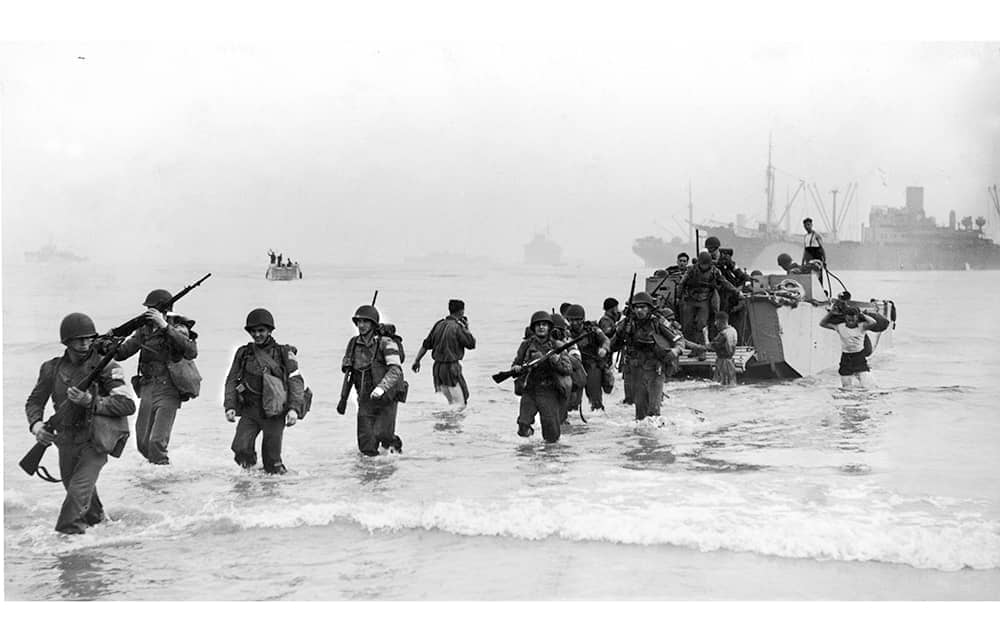In February 1941 four US officers were landed from a British warship at Sheerness, bundled into vehicles and driven to Bletchley Park, Buckinghamshire, a large redbrick house amid wartime huts. They were greeted at midnight by the head of Bletchley with sherry, whisky being in short supply.
They carried with them a secret device called the Purple Machine, which deciphered previously impregnable Japanese communications. In return, they were given full details of Bletchley’s breaking of the German Enigma cipher. Yet it would be another ten months before the US entered the war. This exchange between two governments of their greatest secrets, with no formal agreement beyond an understanding that they would work together, was an unprecedented act of intelligence co-operation, beginning what has become known as the Special Relationship.
It grew out of speeches by and private understandings between Churchill and Roosevelt. The actual exchange of ‘cryptographic information’ was initiated by Stewart Menzies, Chief of MI6 (Bletchley Park was acquired, set up and run by MI6 until it became GCHQ, an independent agency, in 1945). It wasn’t all gas and gingerbread, with reservations on both sides. Some British did not trust the Americans to keep their greatest secret and eventually Churchill had to rule that there should be ‘complete co-operation’, i.e. sharing the work, not just the results.
Equally, some Americans were Anglophobes, either because of their perceptions of Irish history (like the current US president), or because they didn’t want to do anything that might help preserve the British Empire, or simply because Bletchley’s achievements outmatched their own. Also, on the American side especially, inter-agency fiefdoms and personal rivalries sometimes hindered full co-operation. But they were swept away by the irresistible floodtide of Bletchley’s work: ‘British success in this field represents, without question, the most astounding and most important cryptanalytic and intelligence achievement in all history,’ America’s leading codebreaker declared.
The history of the Special Relationship is much more than a war story, of course, and one of the many strengths of Michael Smith’s account is his charting of its transition from co-operation through wartime expediency to Cold War collaboration. This was formalised in a 1946 agreement to continue not ‘complete’ but ‘unrestricted’ co-operation on communications intelligence (Comint). Crucially, it also embraced sharing arrangements with Canada, Australia and New Zealand, leading to what is now known as the Five Eyes intelligence alliance.
Nor was it only Comint co-operation that began over midnight sherry in 1941. Human intelligence (Humint) links were also established at the initiative of Menzies, persuading the Americans to set up an overseas intelligence service to share operations and spheres of influence with MI6 and SOE (Special Operations Executive).
After much wrangling and internal bickering – again, mainly due to inter-service rivalries on the American side – the US Office for Strategic Services (OSS) was set up. In a 1942 London agreement the world was divided into spheres of influence where either side could take the lead; this became a key feature of the postwar intelligence relationship, surviving the disbandment of OSS and its replacement by the CIA. In practice, relationships between Humint agencies were more prone to hiccoughs than in Comint, partly because of differences in role. MI6, for example, wanted agents to work undercover to produce intelligence whereas SOE wanted them to blow things up; OSS wanted both.
Smith carefully delineates the causes of overlap and competition while fully acknowledging examples of effective co-operation such as Operation Torch, the successful landing of 110,000 Allied troops in North Africa, and operations in the run-up to D-Day. Postwar examples include the CIA/MI6-sponsored coup in Iran, reporting from Hanoi during the Vietnam war, the Russian Penkovsky case and, more recently, work against nuclear proliferation, the dismantling of Libya’s nuclear programme and work against al Qaeda and Isis.
A lot of nonsense gets written about the Special Relationship, partly by politicians trying to big it up but mainly by sections of the media determined to pooh-pooh it. Politicians come and go, relations between them vary and independent governments will always pursue what they see as their best interests, regardless of the effects on allies.
Yet, for more than 80 years now the unprecedented collaboration between British and US intelligence services, along with the rest of the Five Eyes, continues to flourish. There’s very close collaboration with other allies, too, but it tends to be on a case-by-case basis rather than systematic and embedded.
With this thorough and very readable account there’s no excuse for anyone failing to understand the Special Relationship. That’s quite apart from the gems and asides Smith engagingly sprinkles throughout – Ian Fleming anticipating Casino Royale by playing baccarat against German intelligence officers; the contribution of the BBC Monitoring Service and its egregious evisceration by George Osborne; and David Cameron’s cosying up to communist China. It all makes for an excellent read.






Comments